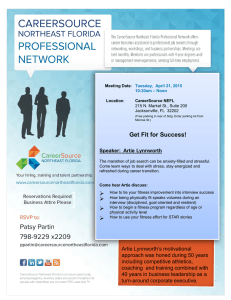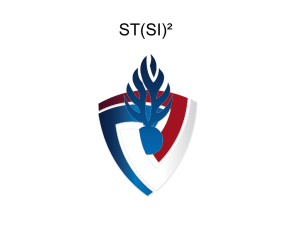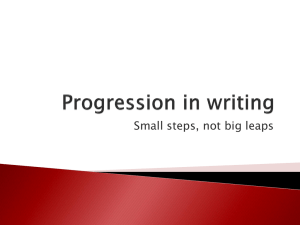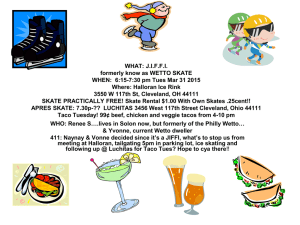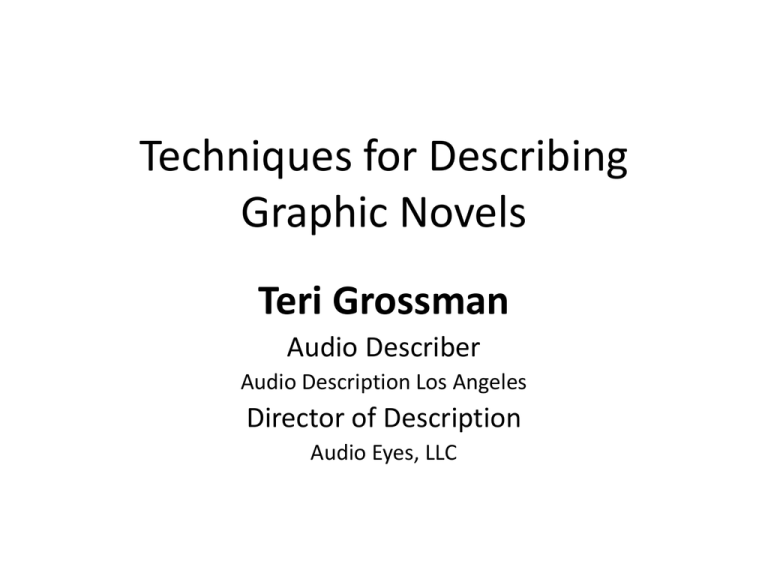
Techniques for Describing
Graphic Novels
Teri Grossman
Audio Describer
Audio Description Los Angeles
Director of Description
Audio Eyes, LLC
What is Audio description?
Audio Description is the technique of
translating visual information into objective,
unbiased words.
What is the purpose of Audio
Description?
• To provide access to essential visual
information to people who are blind or have
low vision.
• So, the goal of graphic novel description is to
ensure that students who are blind or visually
impaired have a comparable experience
reading their materials as their sighted
classmates.
General Principles of Graphic Novel
Description
1. Clearly identify the narration. Nar:
2. Clearly identify the speakers. Steve:
3. Clearly delineate the description. Des:
These go all go together with labels so that
the reader can distinguish between the
author’s work and the describer’s. The labels
are explained in the describer’s notes.
General Principles of Description
4. Use the present tense.
The story is unfolding now, in the present, so
the present tense is both appropriate and
concise. Not “Jack and Jill are going up the
hill,” rather “Jack and Jill go up the hill.”
General Principles of Description
5. Transcribe the text as written including the
original punctuation.
Check – you already do this.
6. Keep the descriptions as concise as possible.
Concise, short sentences are easier to
understand and won’t distract or compete
with the text.
General Principles of Description
7. Use the indefinite article “a” when a subject
or object is new; use the definite article “the”
when the subject or object is seen again.
The first time something is seen it is “a pail.”
When it is seen again it is “the pail” to
reinforce that this is the same pail.
General Principles of Description
8. Describe only what is essential.
Here is the tricky part – what is essential?
Describe this cartoon
Describe this cartoon.
Describe this cartoon
General Principles of Description
9. Do not let the description interrupt the story.
Description is intended to complement the
story not to interfere or to take its place.
The describer decides where in each panel the
description will go in relation to the narration
or the speakers. Sometimes it is places before
sometimes after and sometimes in between
this elements.
page 13
Nar: I was at that time, young, and really a nice, handsome boy.
Des: He heads up a flight of steps that have wrought iron railings.
Des: Inside an apartment. He hangs up his hat. A candlestick telephone
is on a dresser.
Nar: I had a lot of girls what I didn't even know that would run after
me.
Phone: RRING
Telephone: Hello, Vladek? This is Yulek...
A friend of mine, Lucia Greenberg, would like to be introduced to you.
Des: Vladek leans on the dresser. His face is reflected in the mirror
above it.
Father: People always told me I looked just like Rudolph Valentino.
Des: Father pedals. Behind him is a huge movie poster - The Sheik. A
mouse in a striped keffiyeh headdress and robe holds a swooning
female mouse is his arms. A small palm tree is in the background.
Nar: Eventually, I took Lucia to dance...
Des: In dark silhouette, their hands are joined.
Lucia: Do you live alone?
Vladek: Yes.
Vladek: I have a small apartment. My parents moved to Sosnowiec.
Lucia: I'd like to see it sometime.
Des: He twirls her.
Vladek: Maybe sometime.
page 5
Preface:
Rego Park, N.Y. c.1958.
Nar: It was summer, I remember. I was ten or eleven...
Des: Three mice roller skate in a line on a sidewalk. The one in
the middle wears a striped shirt. Nearby, a dog smoking a pipe
mows a lawn.
Lead Mouse: Last one to the schoolyard is a rotten egg!
Nar: ...I was roller-skating with Howie and Steve...
...til my skate came loose.
Des: In a smaller circle inside the panel, the lace-up shoe slips
out of the front skate clamp. The mouse in the striped shirt falls.
Mouse in the striped shirt: Ow!
Hey! Wait up fellas!
Des: He sits on the sidewalk, holding his leg. A star is above his
bent knee. The last mouse looks back.
The last mouse: ROTTEN EGG! HA HA!
Des: Legs extended in front of him, he sits on the sidewalk, his
skate on the grass.
Mouse in the striped shirt: W-ait up!
Des: He carries his skate in one hand and rubs his eye with his
fist. Another mouse wearing pince-nez glasses saws a piece of
lumber.
Mouse in the striped shirt: Snk, Snk.
Nar: My father was in front fixing something...
page 6
Father: Artie! Come to hold this a minute while I saw.
Mouse in the striped shirt, Artie: Snrk?
Father: Why do you cry, Artie? Hold better on the wood.
Artie: I - I fell, and my friends skated away w-without
me.
Nar: He stopped sawing.
Father: Friends? Your Friends?...
Father: If you lock them together in a room with not
food for a week...
Des: Father resumes his position, his knee on the
lumber.
Father: ...Then you could see what it is, friends!…
General Principles of Description
10. Do not describe moods, motives or
reasoning of the characters.
These are unseen emotional states and are
not described. Describe what you can see.
Trust the reader to grasp the context and
allow them to reach their own conclusions
about the moods, motives and reasoning.
Techniques
A. Read the story. What happens?
What are the principle people, places
or things in the story?
Techniques
B. Describe the cover, title page,
copyright page, dedication if there is
one.
Cover Description from Maus
Cover
Des: In a chalk drawing, on a gray-brown background, two
blue mice sit beneath a swastika. The larger mouse wears a
tan trench coat that is buttoned and the belt buckled. His
long slender tail rises up behind him. His left arm encircles
a smaller mouse, whose pear shaped head appears above a
green blanket that covers him. They stare straight ahead. A
faint shadow of the two is cast on the wall behind them.
In the center of the black swastika is an angular, white, cat
face with slits for eyes and long whiskers. The upper left
side of the face is black. Thick black lines create the
swastika: turn a plus sign 45 degrees; from the end of each
arm, add a minus sign extending clockwise at a 90 degree
angle. This black symbol is inside a stark white circle.
Dedication & Copyright page Maus
Dedication & Copyright page
"The Jews are undoubtedly a race but they are not human." Adolph Hitler
Thanks to Ken and Flo Jacobs, Ernie Gehr, Paul Pavel, Louise Fili, and
Steven Heller, whose appreciation and moral support have helped this
book find its shape.
Thanks to Mala Spiegelman for her help in translating Polish books and
documents, and for wanting Maus to happen.
And thanks to Françoise Mouly for her intelligence and integrity, for her
editorial skills, and for her love.
Copyright 1973, 1980-86 by Art Spiegelman. All rights reserved.
Chapters 1 through 6 first appeared in somewhat different form in Raw
magazine between 1980 and 1985. "Prisoner on the Hell Planet" originally
appeared in Short Order Comix #1, 1973.
ISBN 0-394-74723-2
Interior page
Describe any interior or title pages.
Interior page
The Man from the cover, this time in jeans and a long sleeve
t-shirt of indeterminate color, lies on the floor with his knees
bent and lower legs resting on the seat of a leather chair
that has round arms. His head rests on a pale blue pillow. A
sketching pad is propped on a knee and the red pencil is in
his right hand. A series of panels are faintly visible on the
pad. Above the image are the words, again crossed out:
Faster than a speeding bullet... More powerful than a
locomoti. Below the image: Look! Up in the sky!
Page 1
Des: A pale yellow quarter sheet of paper is on the facing
page. The edges are smudged with white-out. At the top are
printed black letters "ay then "ttan". The rest of the letters is
covered with white-out. Below, a hand written "May 5."
Below that, the word "Diagnosis" with a thin black line
above and below. The next line is blotted out except for the
letters "TON" flowed by a curvy red "S". At the bottom of
the sheet "MARKS T".
Nar: What I think about most is the big red S…
Describer’s Notes
C. Let the reader know how the description
fits into the text of the story.
Describer's Notes:
The story panels flow from left to right, top to bottom. The number of
panels per page varies; usually there are 8 equally sized panels that are
2½" long and 2" high in two rows.
All the text in the story is hand written in capital letters. The hand drawn
lettering is sometimes bolded, or smaller than usual. The narration is in
rectangular boxes or outside the panel; words spoken by the characters
are in bubbles with an tail pointing to the speaker. Text that represents
what a character is thinking is in a bubble with increasingly smaller
bubbles that lead to the "thinker". They are referred to as thought
bubbles. Text that is whispered is in parentheses. Text that is shouted or
angry has a jagged bubble around it. In this described version, the text
that is narration is labeled Nar:. When the narration continues
uninterrupted from one panel to the next it will not be labeled again. The
description is labeled Des:.
The text and description for each panel will be separated by a double
paragraph break. The story is divided into 6 chapters. Print page numbers
in are located in the center at the bottom of the page. In this described
version, the page numbers are in the upper left, preceding the contents
for that page. The page numbers are followed by one paragraph break.
The Art Work
D. Talk about the art work. If the art work is
consistent throughout say so.
"The artwork: The story is illustrated in black on
white paper. The characters, all animals, walk
upright and wear clothing. The mice have long
noses, round upright ears, a dot(s) for eyes, and
whiskers. Their mouths are usually not seen.
Eyebrows are occasionally added. More complete
facial features are apparent on the pigs, cats and
dogs."Ex: from Maus
The Art Work
Or in the case of It's a Bird…
"The artwork: The color artwork varies
considerably and will be treated in the
description. Much of it is watercolor and has
the uneven characteristic of the medium."
Transcribe and describe
E. Follow the top to bottom left to right
pattern unless the author has altered the flow.
page 12
Nar: After dinner he took me into my old room...
Father: Come - we'll talk while I pedal...
Des: Father climbs onto a stationary bike. Artie sits in a straight back
chair by a desk.
Father: It's good for my heart, the pedaling. But, tell me, how it is by
you? How is going the comics business?
Artie: I still want to draw that book about you...
The one I used to talk to you about..
Des: Artie holds a photograph.
Artie: About your life in Poland, and the war.
Father: It would take many books, my life, and no one wants anyway to
hear such stories.
Des: On Father's left forearm is a tattoo of numbers: 175113.
Des: Artie points to the photograph.
Artie: I want to hear it. Start with Mom... Tell me how you met.
Father: Better you should spend your time to make drawings what will
bring you some money...
But, if you want, I can tell you...I lived the in Czestochowa, a small city
not far from the border of Germany...
Des: In a round panel is a mouse in light overcoat with a dark collar,
and dark hat. His left hand is in his coat pocket. In the other he
carries a briefcase.
Nar: I was in textiles - buying and selling - I didn't make much, but
always I could make a living.
Describe every panel?
F. It may not be necessary to describe every
panel. If several panels are similar, let the
story move forward without interruption.
page 45
Nar: It was everything quiet until near morning...
Artie: Wait a minute. They only trained you for a few days
before sending you into combat?
Des: Father sits in an upholstered arm chair. Artie lies on
his stomach, notebook in front of him, pencil in hand.
Father: Well, the first time I went into the army for 18
months when I was 21. Then every 4 years I went to Lublin
for a month to train.
You know, my father tried to keep all his children out from
the army..
..because when he was young, he had then to go into the
Russian army. ...and there they took you for 25 years. ...to
Siberia!
My father pulled out 14 of his teeth to escape. If you missed
12 teeth they left you go.
So, when my brother Marcus got 21 years, father put him on
a starvation diet. Always Marcus was sickly - so thin. And
when he went for the army examination...they didn't take
him.
A year later when it came my turn, father wanted to make to
me the same thing. It was something terrible!...
page 89
Des: He sits, forearms resting on the table.
Des: He reads in the leather chair, a comic in
his lap.
Des: He sleeps in the chair, head propped on
hand, the comic open on his chest.
Des: Still in his clothes, he lies face down on
the bed, comics strewn on the floor.
Des: Back in the leather chair, Steve wears an
orange robe and holds a TV remote.
Des: He reads. More comics on the floor.
Character Introduction
Use a character’s name only after they are
named in the story. Since sighted readers do
this visually, it is the describers responsibility
to find a visual element of the character to use
until the story revels their name.
page 2
Nar: It didn't look like the rest of the letters on the report.
Des: In a hallway. On the right, two blonde children sit on chairs, their
feet not reaching the floor. The smaller one looks at papers on a chair
next to him. Three faint greenish figures stand together at the far end
that glows with pale yellow light where it meets another hallway.
Nar: It looked out of place.
Des: The small boy has mop of hair that covers his forehead and the
tips of his ears. He wears a jacket with a dark collar and a t-shirt under
it. He lifts the top sheet of paper.
Nar: Like it was added later…
Des: A close up of the black letters ON and the curving, brighter red
"S" that has an extra upward mark at the end of the upper arc.
Nar: An afterthought…
Des: The larger boy has hair like the smaller boy's and stares straight
ahead. His jacket is a larger version of the smaller boy's.
Nar: I was with my Mom and Dad and my brother, David, in a hospital
in North Carolina-Des: A three story building with a covered entrance and rows of tall
narrow windows is bathed in pale orange light with a dirt field behind.
Nar: --or Colorado-Des: The same building, blue green in color, with snow on the ground
and snow flurries falling.
Nar: --or California-Des: The building with two rows of palm trees in front.
page 3
Nar: I don't remember which exactly.
Des: There are now four figures at the end of the hallway. One is a
woman and next to her a man gestures to his left. The small boy's
profile reveals an upturned nose.
Nar: I was only five years old.
I do remember how it smelled…
Des: A man in a white lab coat pushes a gurney, the body on it covered
by a crumpled white sheet.
Nar: Like people were trying to cover up something bad with
something worse.
David: That guy's dead!
Small Boy: Nuh-uh!
David: Uh-huh!
Des: The small boy holds the papers up, shielding himself. David waves
his arms. A woman with reddish brown hair wearing a blue-green, long
sleeve top, stares at the two, arms crossed.
Woman: What are you doing with that paper?
Des: Resting the papers on his lap, the small boy puts his fingers on it.
Small Boy: I'm… readin' it.
David: You can't read!
Small Boy: Yes I can!
Woman: Don't mess with things that aren't yours.
Des: She takes the papers and smacks the Small Boy. He puts a hand to
his cheek.
Small Boy: OW!
Des: David stands.
David: We wanna go home.
page 5
Preface:
Rego Park, N.Y. c.1958.
Nar: It was summer, I remember. I was ten or eleven...
Des: Three mice roller skate in a line on a sidewalk. The one in
the middle wears a striped shirt. Nearby, a dog smoking a pipe
mows a lawn.
Lead Mouse: Last one to the schoolyard is a rotten egg!
Nar: ...I was roller-skating with Howie and Steve...
...til my skate came loose.
Des: In a smaller circle inside the panel, the lace-up shoe slips
out of the front skate clamp. The mouse in the striped shirt falls.
Mouse in the striped shirt: Ow!
Hey! Wait up fellas!
Des: He sits on the sidewalk, holding his leg. A star is above his
bent knee. The last mouse looks back.
The last mouse: ROTTEN EGG! HA HA!
Des: Legs extended in front of him, he sits on the sidewalk, his
skate on the grass.
Mouse in the striped shirt: W-ait up!
Des: He carries his skate in one hand and rubs his eye with his
fist. Another mouse wearing pince-nez glasses saws a piece of
lumber.
Mouse in the striped shirt: Snk, Snk.
Nar: My father was in front fixing something...
Contact me if you have
questions:
terigrossman@earthlink.net

